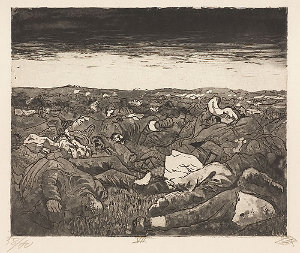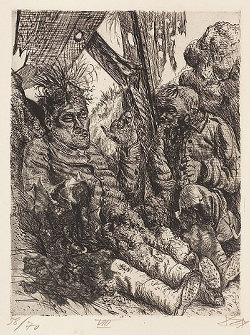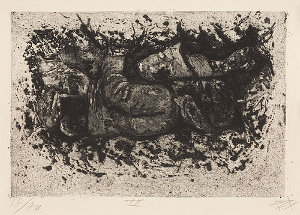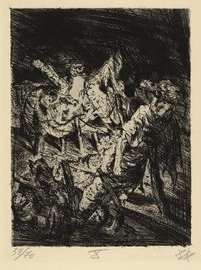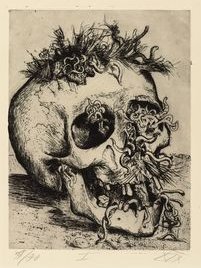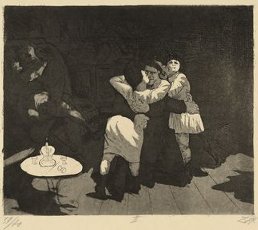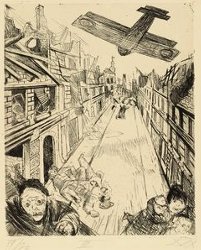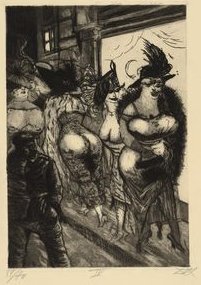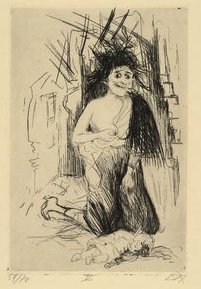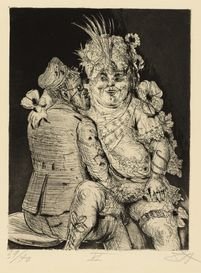Abend in der Wijtschaete-Ebene (Nov. 1917)
Evening on the Wijtschaete Plain - Nov 1917
Year: 1924
Description: The Ypres lines were among the most hotly contested in the Great War. In 1917, Haig attempted another assault on German positions. The goal was Passchendaele. If the British could capture the town then they could straighten their line and create a more defendable front. With a brutal inital assault, the Biritsh met their early objectives in a week. Months later, they recaptured what remained of Passchendaele. Here Dix depicts the price of a straightened line...
Provenance: Der Krieg; #27
National Gallery of Austrailia
Canberra
Seen on the escarpment at Clery-sur-Somme
Gesehen am Steilhang von Clery-sur-Somme
Year: 1924
Description: Dix has stumbled upon two putrefying bodies in conversation. Their joints are slowly separating. A jaw has toppled to the ground and a plant has taken root in a shattered skull. Ernst Junger described a similar scene while on patrol. These are the memories that last a life time.
Provenance: From Der Krieg; #28
National Gallery of Austrailia
Canberra
Found while digging a trench - Auberive
Gefunden beim Grabendurchstich - Auberive
Year: 1924
Description: To this day, the ground along the Western Front is filled with surprises.
Provenance: Der Krieg; #29
National Gallery of Austrailia
Canberra
Tangled Barbed Wire before the Trench
Drahtverhau vor dem Kampfgraben
Year: 1924
Description:
Barbed wire was invented in the 1870s for cattle containment. In the First World War, it was widely used as a defensive barrier. A soldier tangled in wire was an easy target for small arms fire.
Provenance: Der Krieg; #30
Museum of Modern Art
New York, NY
Skull
Schädel
Year: 1924
Description:
For all its waste, the war provided a windfall for scavengers. The First World War produced generations of happy worms and maggots. Trench rats roamed as big as beavers. Gas was sometimes a welcome respite as it decimated these pests.
Provenance: Der Krieg; #31
Museum of Modern Art
New York, NY
Sailors in Antwerp
Matrosen in Antwerpen
Year: 1924
Description:
Dix often displays contempt for sailors. After a few early engagements with the British fleet, the German Navy spent most of the war in harbor. Dix's sailors are often seen whoring while the Wehrmacht suffered the nightmare of the trenches.
Provenance: Der Krieg; #32
Museum of Modern Art
New York, NY
Lens Being Bombed
Lens wird mit Bomben belegt
Year: 1924
Description:
Lens was occupied by the Germans during the First World War. Its civilian population suffered terribly in the Allied campaign to dislodge them. Here residents flee an aerial assault.
Provenance: Der Krieg; #33
Museum of Modern Art
New York, NY
Front-line Soldier in Brussels
Frontsoldat in Brüssel
Year: 1924
Description:
A soldier lurks in darkness surrounded by voluptuous whores in expensive clothing. In this view, they are nothing more than war profiteers. In reality they lived in dire poverty.
Provenance: From Der Krieg; #34
Museum of Modern Art
New York, NY
The Madwoman of Sainte-Marie-à-Py
Die Irrsinnige von Sainte-Marie-à-Py
Year: 1924
Description:
On the ground, Dix depicts the toll on the civilian population. Here a crazed mother, stricken by madness, offers her naked breast a dead child who bleeds at her knees.
Provenance: From Der Krieg; #35
Museum of Modern Art
New York, NY
Visit to Madame Germaine's in Méricourt
Besuch bei Madame Germaine in Méricourt
Year: 1924
Description:
Dix persues an earlier theme. Here a small and under nourished soldier visits a well-fed, well-dressed French whore.
Provenance: Der Krieg; #36
Museum of Modern Art
New York, NY
